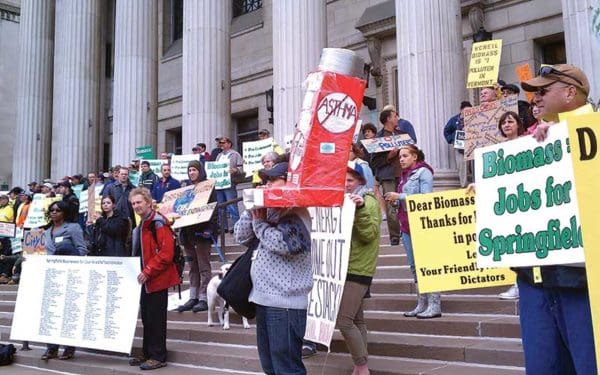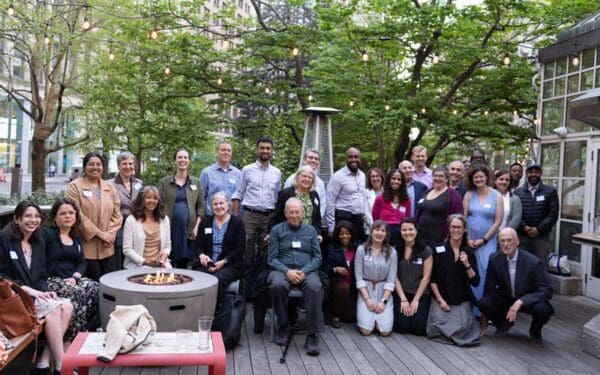
Woody biomass fuel emits more carbon dioxide when burned than coal does, and it harms people nearby who breathe in its pollution. Photo Credit: Pixabay
Earlier this year, I joined Springfield, Massachusetts, residents protesting proposed changes to a state policy that would help build a dirty power plant in their neighborhood. As written, these changes would significantly roll back hard-fought protections against environmentally harmful biomass plants. Community members were unanimous: they do not want these changes, and they do not want this plant.
CLF agrees. These policy changes would incentivize biomass plants to emit more dangerous air pollution, underreport their climate impacts, and take families’ and businesses’ money while harming the health of our communities. They prioritize profits for industry executives over the people who live and work near the plants. And, while biomass developers are pushing for changes that would imminently affect Springfield, weakening this regulation encourages companies to build dirtier power plants in other vulnerable communities, too.
This Policy Reversal Would Increase Dangerous Air Pollution and Greenhouse Gas Emissions
The Commonwealth’s energy agency is proposing changes to the Massachusetts Renewable Portfolio Standard—a state regulation that requires electric companies to buy more and more of their electricity supply from clean, renewable energy sources every year. Power generators can receive extra money from electricity customers for energy they produce that meets the regulation’s criteria. In general, this incentivizes developers to build more renewable energy.
Right now, biomass only counts as clean energy under this policy if it follows a few specific standards:
- The technology used to burn the wood is highly efficient.
- The plant uses state-of-the-art pollution controls.
- Owners account for the increase in greenhouse gas emissions from transporting and using the fuel they burn, and they report these numbers.
Woody biomass fuel emits more carbon dioxide when burned than coal does, and it harms people nearby who breathe in its pollution. It has become increasingly clear to environmental advocates and communities that electric power plants fueled by biomass should be removed from the Renewable Portfolio Standard altogether. Massachusetts, at least, created strict standards to ensure that subsidized biomass does as little harm as possible. But these standards are now under threat.
What New Regulations Are Being Considered?
So, what are the changes being considered, and what do they mean for Massachusetts residents? Among others, the energy agency is proposing to:
- Allow more polluting biomass plants to be considered “clean” by reducing or removing efficiency requirements for them. This would allow companies to build dirtier plants and earn subsidies for outdated and inefficient technology.
- Let biomass plants emit more air pollution than they do now by eliminating the need for them to show that they are following their air permits. This could result in plants polluting more than their air emission limits allow.
- Let biomass plants underreport their true climate impacts by ignoring the carbon pollution that comes from turning wood into pellets or chips and then burning it. The proposed changes would let new biomass plants significantly underestimate the amount of greenhouse gas emissions they produce and overestimate the emissions stored in the forests where the trees originated.
- Allow biomass plants to burn more kinds of trees while claiming carbon benefits. The new rule would greatly expand the types of wood eligible as biomass fuel, meaning that more trees would be cut down and burned.
- Loosen the reins of government oversight. Less oversight of new biomass plants, particularly with the rest of these changes, means communities won’t know if a plant is operating properly or not.
Each of these changes is a step backwards. CLF and other advocates fought hard for the current environmental and health protections back in 2012. Not only will these changes increase greenhouse gas emissions, they will escalate dangerous air pollution in local neighborhoods and communities.
So Why Is the State Considering This?
Weakening the state standards around clean energy benefits the biomass industry, which is why companies like Palmer Renewable Energy (a biomass energy developer) have been lobbying for these changes for years. With the new standards in place, a plant like the one Palmer has proposed in Springfield would be able to collect between $5 million and $8 million in extra money from Massachusetts electricity customers to subsidize its polluting operations.
While Palmer would profit, Springfield residents would suffer. Springfield is already overburdened by poor air quality. A biomass plant here means a new smokestack releasing tons of dangerous pollutants, including heavy metals and carcinogens like benzene. It means that every breath residents take in their hometown increases their chances of respiratory illness, like asthma, associated with air pollution. It means more hospital visits and higher healthcare costs. No environmental justice community, including Springfield, should bear the consequences of poor environmental policy.
This is why CLF, along with Springfield residents and other community and environmental organizations, opposes both the Palmer biomass plant and the Renewable Portfolio Standard changes that could make it a reality. Massachusetts’s clean energy future has no room for greenwashed energy subsidies or additional burdens on environmental justice communities.



